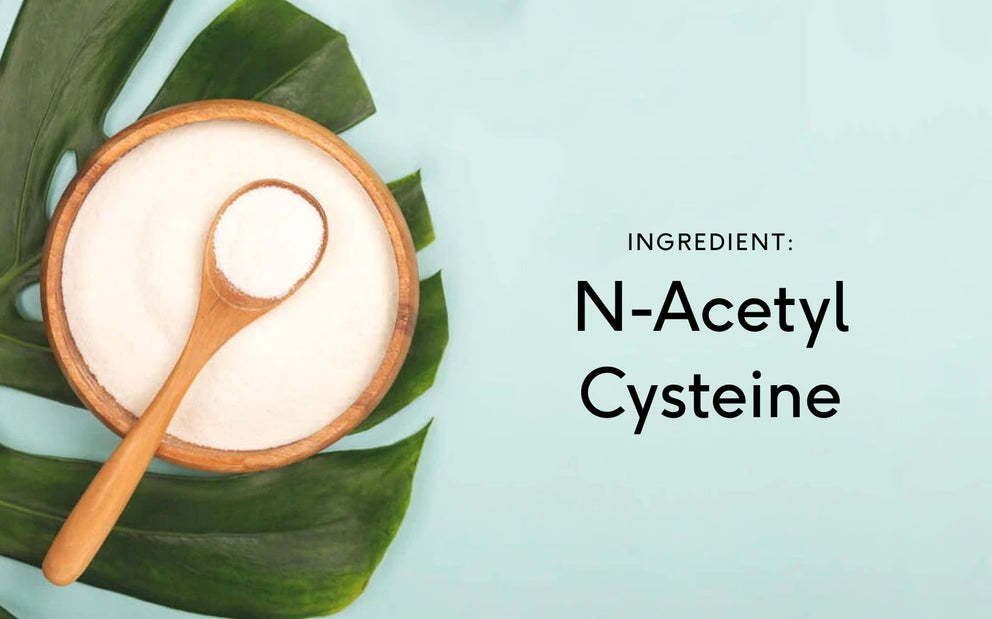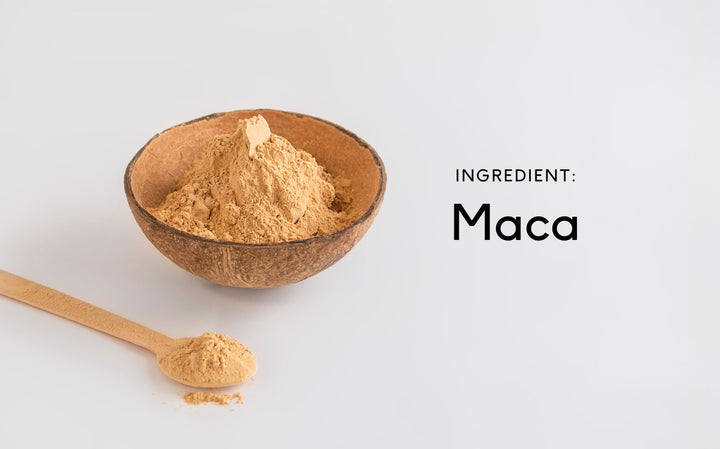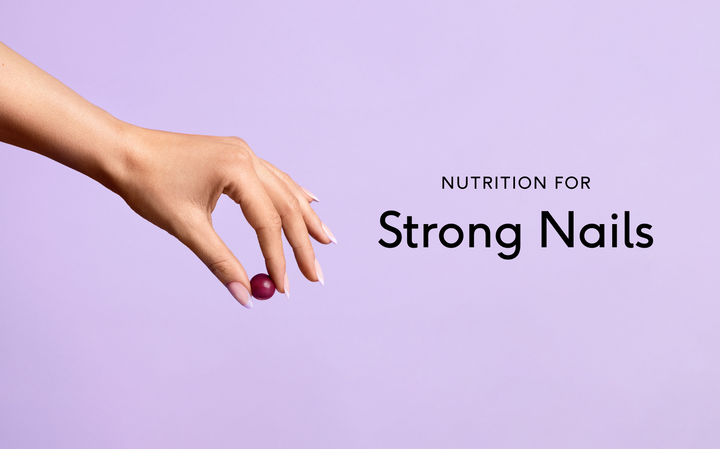Learn About N-Acetyl Cysteine in 5 Minutes
Table of contents

What is N-acetyl cysteine (NAC)?
N-acetyl cysteine (NAC), a form of cysteine, is an amino acid that can become essential when you are deficient in the essential amino acids methionine and serine. Your body needs cysteine to produce glutathione, but this amino acid is only considered to be semi-essential since it is usually synthesised in your tissues using serine and methionine.
Glutathione is considered to be your body’s most powerful antioxidant, so obtaining cysteine from NAC or another source is absolutely essential to your health. In addition to facilitating the potent effects of glutathione, NAC may also directly improve your neurological health, help with detoxification, improve respiratory function, boost immunity, promote åsexual health, and provide additional benefits.
Is NAC water-soluble or fat-soluble?
NAC is highly soluble in water. In fact, this substance is considered to be even more water-soluble than L-cysteine, another popular form of cysteine.
Where can N-acetyl cysteine be found naturally? Common sources of NAC:
L-cysteine, the natural form of this amino acid, is found in various high-protein foods, such as meat, dairy, and legumes. NAC, however, is a modified form of L-cysteine, so it is not found in any food sources.
What is the recommended daily value for NAC?
Major regulatory agencies do not recognise NAC as an essential nutrient, so there is no official daily dose or nutrient reference value (NRV) for this substance. In clinical studies, however, this modified amino acid is often administered in concentrations of 0.5-1g per day.
Can you absorb enough NAC from food?
NAC, the modified form of L-cysteine, is not available in any food sources, so it is necessary to consume this substance in supplement form.
Why is NAC necessary for your body?
Your body cannot produce the all-important antioxidant glutathione without cysteine, and NAC appears to be one of the most bioavailable and potent forms of this amino acid. In addition to promoting the production of glutathione, NAC also appears to exert impressive benefits throughout the body by producing neurotransmitters, removing heavy metals, and performing a wide range of other essential tasks.
Functions of NAC
- Potential antioxidant benefits: Since NAC is necessary for the production of glutathione, this amino acid appears to improve antioxidant activity in your body, and NAC also appears to have its own antioxidant properties.
- Potential neurological and mood benefits: A wide range of both lab and clinical studies indicate that NAC may help with depression, anxiety, obsessive-compulsive disorder (OCD), addiction, and schizophrenia. Scientists suggest that these potential benefits may be related to the critical role of NAC in producing glutamate, the brain’s most important neurotransmitter.
- Potential detoxification benefits: NAC may remove heavy metals from your liver and kidneys. This substance is commonly used to prevent organ damage in instances of acetaminophen overdose.
- Potential respiratory benefits: NAC appears to help with respiratory conditions, such as chronic obstructive pulmonary disease (COPD), bronchitis, and cystic fibrosis.
- Potential immune benefits: Due to its ability to increase glutathione levels in your body, NAC is believed to improve your overall immunity. NAC may even help with severe immune conditions such as HIV.
- Potential sexual health benefits: NAC appears to improve virility in men, and this substance may also help with ovulation in women who suffer from polycystic ovary syndrome (PCOS).
When should you take NAC?
If you enjoy a balanced diet with plenty of protein, you might already be getting enough cysteine to produce the glutathione your body needs. However, it's all too easy to become deficient in cysteine and its precursors, methionine and serine, so taking cysteine as a daily supplement is a good idea regardless of your current health status. NAC appears to be the most potent and useful form of cysteine that science has yet devised, but that’s hardly the full extent of this substance’s unique benefits. Whether you want to improve your immunity, boost your fertility, detoxify your body, or boost your brain, NAC may be a useful tool for fine-tuning your health and well-being.
How long do you need to take NAC to start experiencing its benefits?
Since NAC is considered to be one of the most bioavailable forms of cysteine, it would be natural to start experiencing the benefits of this substance after just 1-2 administrations.
How long does it take for your body to digest/absorb NAC?
Your body should fully process this highly water-soluble substance within less than 24 hours.
How long does NAC stay in your body after you take it?
Since NAC is water-soluble, it will be processed into glutathione and other beneficial substances soon after absorption.
Is NAC an antioxidant?
Research suggests that NAC may have its own antioxidant benefits in addition to contributing to the production of glutathione, the body’s most powerful antioxidant.
Can you overdose on NAC? What are the effects?
Numerous cases of NAC overdose have been reported in association with the use of this substance to treat acetaminophen overdose. Symptoms of NAC overdose include respiratory distress, vomiting, and high blood pressure.
Does NAC dissolve, flush out, or build up in the body?
NAC rapidly dissolves after ingestion and is used to produce other compounds.
Can you take NAC during a diet?
Antioxidants may help with weight loss, and NAC does not interfere with any common dietary restrictions.
Are there synthetic forms of NAC?
NAC is considered synthetic since it is a modified form of L-cysteine. However, NAC is not made using artificial chemicals.
Absorption rate of synthetic NAC
NAC appears to have substantially higher bioavailability than natural forms of cysteine.
Why might natural forms of NAC be better?
In addition to offering higher bioavailability, NAC also appears to exert benefits that are not offered by L-cysteine, so this augmented form of cysteine may actually be superior to natural alternatives.
How to take NAC
NAC is generally taken orally in the form of a supplement.
N-acetyl cysteine trends in medicine
In 2020, a lab study was published indicating that NAC may improve the cognitive deficits caused by depression by altering your neurochemistry, providing further evidence for NAC’s critical role in brain heath. Also in 2020, a new study added further emphasis to the idea that NAC may help with liver detoxification by showing that this amino acid may reduce the muscular degeneration symptoms associated with severe liver disease.
Sources
1. The Antioxidant Role of Glutathione and N-Acetyl-Cysteine Supplements and Exercise-Induced Oxidative Stress
2. The Promise of N-acetylcysteine in Neuropsychiatry
3. Cysteine Metabolism and Metal Toxicity
4. N-acetylcysteine in COPD: why, how, and when?
5. High-dose oral N-acetylcysteine, a glutathione prodrug, modulates inflammation in cystic fibrosis
6. Glutathione and Immune Function
7. Influence of Glutathione Availability on Cell Damage Induced by Human Immunodeficiency Virus Type 1 Viral Protein R
8. Efficacy of Selenium and/or N-acetyl-cysteine for Improving Semen Parameters in Infertile Men: A Double-Blind, Placebo Controlled, Randomized Study
9. N-acetyl cysteine ameliorates depression-induced cognitive deficits by restoring the volumes of hippocampal subfields and associated neurochemical changes
10. N-Acetyl Cysteine Attenuates the Sarcopenia and Muscle Apoptosis Induced by Chronic Liver Disease























































 Back
Back





